|
|
|
Sort Order |
|
|
|
Items / Page
|
|
|
|
|
|
|
| Srl | Item |
| 1 |
ID:
092963
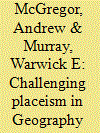

|
|
|
|
|
| Publication |
2009.
|
| Summary/Abstract |
Geography's central concern is place. Ironic, then, that it is characterised by placeist relations of power that permeate both the production and consumption of geographical knowledge.
|
|
|
|
|
|
|
|
|
|
|
|
|
|
|
|
| 2 |
ID:
084424
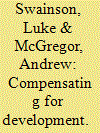

|
|
|
|
|
| Publication |
2008.
|
| Summary/Abstract |
Abstract: In 2001, two indigenous Orang Asli communities living in Peninsula Malaysia were forced to leave their homelands to make way for the Sungai Selangor dam. The dam, built to resolve water shortages in Kuala Lumpur, came with a comprehensive compensation package designed to alleviate the hardships faced by the displaced communities. This paper explores the discursive and material impacts of these compensation packages. We argue that the emerging literature on compensation for displaced people values the same sorts of economic and social criteria as the Malaysian government does in its pursuit of modernising the Orang Asli. Their shared belief that effective compensation would improve the quality of life for affected communities above pre-displacement levels helped to publicly legitimise the dam-building project. Interviews with the displaced communities, however, found stark differences in community satisfaction which have more to do with losses of intrinsic place-based cultural and spiritual values, for which there may be no effective or adequate compensation, than social and economic criteria. We conclude that compensation programmes will always struggle to effectively cope with these less tangible place-based values and that open acknowledgement of this weakness is required if alternatives to displacement-inducing development projects are to be more readily considered.
|
|
|
|
|
|
|
|
|
|
|
|
|
|
|
|
| 3 |
ID:
078951
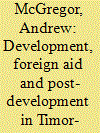

|
|
|
|
|
| Publication |
2007.
|
| Summary/Abstract |
Post-development theories have successfully challenged many of the ways in which we think about development but have yet to substantially influence development practice. In this paper I explore what opportunities exist for applying post-development ideas within the current development apparatus of Timor-Leste. Four types of community-focused programmes are analysed: sectoral project-based initiatives, institutional capacity-building programmes, community partnerships and small grants programmes. While alternative opportunities are clearly shown to be present, it is argued that they are rarely realised because of the overwhelming priority to produce better agents of development, rather than those able to pursue 'alternatives-to-development'. The paper concludes by suggesting that the development apparatus itself may not be inherently faulted; instead this apparatus could be usefully utilised by those inspired by alternative imaginaries to pursue post-development goals.
|
|
|
|
|
|
|
|
|
|
|
|
|
|
|
|
| 4 |
ID:
138255
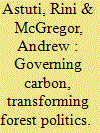

|
|
|
|
|
| Summary/Abstract |
The Reducing Emissions from Deforestation and Forest Degradation Plus (REDD+) programme seeks to reshape the way we value, govern and interact with forests. Rather than managing forests according to interests in timber, conservation, land or livelihoods, REDD+ encourages forms of forest management that prioritise carbon. While international negotiations are shaping the rules of the programme, how it takes place on the ground will depend on its interpretation and implementation in different places. In this paper, we are interested in how the REDD+ Task Force (Satgas REDD+), an ad hoc body formed by presidential decree to design and implement REDD+ readiness activities in Indonesia, has attempted to mainstream the programme from 2010 to 2013. We develop a governmentality approach to focus on how the Task Force sought to introduce REDD+ carbon rationalities to forest politics. Based on extended ethnographic research, we identify three strategies: adopting and promoting the carbon discourses circulating among global REDD+ communities; making carbon visible and governable through mapping technologies; and implementing participatory technologies to encourage pro-REDD+ subjectivities. In some ways, the Task Force has been successful in building awareness about forest carbon among forest stakeholders in Indonesia. National civil society organisations, in particular, appear to be supportive of REDD+; however, they emphasise ‘co-benefits’ framed as ‘Beyond Carbon’, informed by social and environmental justice. For others, however, forests remain sources of timber and land, and new strategies are required if REDD+ is to have substantial impacts on forest governance in Indonesia. The Task Force's efforts reveal the difficult and contested processes through which global climate change programmes come to be embedded in national arenas.
|
|
|
|
|
|
|
|
|
|
|
|
|
|
|
|
| 5 |
ID:
092969


|
|
|
|
|
| Publication |
2009.
|
| Summary/Abstract |
Increasing attention is being paid to how workers in the creative industries negotiate transitions from amateur to professional status and seek opportunities for work and spaces for expression that suit artistic desires. The settings have usually been large cities with populations that can support diverse and specialised audiences and subcultural scenes. In this paper, we discuss research where we participated in a music scene, and talked to dance music disc jockeys and venue owners in a small, regional university city - Dunedin. In Dunedin opportunities for musical work are comparatively plentiful but are constrained in a number of ways. Disc jockeys negotiate audience demands, distances from key musical centres and associated infrastructure, and the shifting venues available for performance. We emphasise the importance of an ethnographic perspective to the study of musical work that remains attuned to the manner in which urban spaces are created, transformed, challenged and remade in the musical nightlife economy.
|
|
|
|
|
|
|
|
|
|
|
|
|
|
|
|
| 6 |
ID:
123518
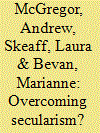

|
|
|
|
|
| Publication |
2012.
|
| Summary/Abstract |
The Catholic Church has played a key role in the development of Timor-Leste since Dominican friars first began trading with the Timorese in the 16th century. Religious networks and spaces have been essential in delivering development services, while Catholic theologies have shaped how development is pursued and understood. In this paper we outline the changing contribution and character of the Catholic Church through three periods of Timor's tumultuous history-during colonialism, under Indonesian occupation and through independence-with a greater focus on the latter stages. We present the Timorese Church as a heterogeneous organisation that responds in both progressive and conservative ways to the socio-political contexts in which it is embedded. Our aim is to highlight the diverse religious development geographies that exist in Timor-Leste but which are marginalised within contemporary development planning and policy. Drawing upon post-development theory and performative research, we encourage debate about the role of religious institutions in inspiring 'alternatives-to-development'.
|
|
|
|
|
|
|
|
|
|
|
|
|
|
|
|
| 7 |
ID:
134399
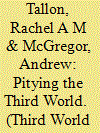

|
|
|
|
|
| Summary/Abstract |
The development sector appeals to emotions in its marketing and education material to raise awareness and funds for its work. Much of this material is now directed at schools, where young people form long-lasting opinions about development and the developing world. This paper draws upon research with 118 students in five New Zealand/Aotearoa secondary schools to show that young people are not passive receptors of development marketing and education. Instead, they question the activities of international ngos involved in aid work and how they are meant to feel or act in response. We examine these emotional responses of young people and the demoralising feelings of guilt, sadness and scepticism that arise, often alongside an innocent paternalism and a desire to help. We outline possibilities for more socially progressive forms of development education, based on the recognition that young people are questioning old ways of doing aid work and looking for something new. We challenge ngos to be part of new forms of global connectedness that disrupt old ‘us and them’ binaries based on difference, and instead to pursue new linkages based on shared feelings of empathy, friendship and social justice.
|
|
|
|
|
|
|
|
|
|
|
|
|
|
|
|
| 8 |
ID:
136138


|
|
|
|
|
| Summary/Abstract |
Reducing Emissions from Deforestation and Forest Degradation (REDD+) is an ambitious global programme oriented towards improving forest carbon management. It aims to attract new sources of ‘green’ capital to fund emissions reductions from avoided deforestation and sustainable forest management. REDD+ is transforming forest conservation, as a diverse array of new stakeholders become involved. Not surprisingly, REDD+ has proved divisive, as critics concern themselves with issues of power, justice, and commodification, while practice-oriented researchers tackle similar issues from different perspectives, focusing on benefit sharing, safeguards, additionality, measuring and verification. In this paper we explore the different roles of critical and practical research, and argue that there is a need for greater sharing of knowledge across current divides. We draw on our own experiences of conducting a research project on REDD+ in Indonesia that involved critical and practice-oriented researchers. We argue that critical research disconnected from practical matters can have perverse outcomes for practitioners who are ultimately working towards similar goals; while uncritical practice-oriented research has the potential to lead to a dilution of core values of environmental justice and conservation. In contrast, forms of practical critique provide ways of researching REDD+ that have practical value while maintaining critical insights.
|
|
|
|
|
|
|
|
|
|
|
|
|
|
|
|
| 9 |
ID:
142659
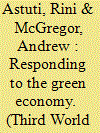

|
|
|
|
|
| Summary/Abstract |
This paper analyses the technologies of government that proponents of the Reducing Emissions from Deforestation and forest Degradation (REDD+) mechanism are adopting to influence forest governance in Indonesia. It analyses the aspects of forest governance being problematised; the solutions being constructed; and who is influencing the production and content of these solutions. The research focuses on three aspects of the One Map Initiative: the forest moratorium; forest licensing; and new standards in participative mapping. Our findings show that the initiative has created new opportunities and constraints for forest reform. New disciplinary and participatory technologies have emerged that have created political spaces for activists to actively promote social and environmental justice concerns. However, our analysis also shows tensions for forest stakeholders between engaging in the new opportunities of the green economy and the risk of having political issues rendered technical.
|
|
|
|
|
|
|
|
|
|
|
|
|
|
|
|
|
|
|
|
|